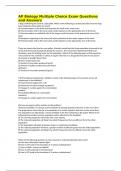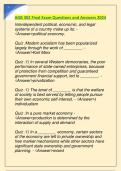Exam (elaborations)
AP Biology Multiple Choice Exam Questions and Answers
- Course
- Institution
AP Biology Multiple Choice Exam Questions and Answers A dog is following the scent of a jackrabbit. Which of the following accurately describes how the dog's brain integrates information for smell? A) Chemoreceptors in the brain send impulses for smell in the nasal cavity. B) Chemoreceptor cells...
[Show more]




